Jedna prosta prawda o udanych stronach WordPress: ułatwienie odwiedzającym interakcji z Twoimi treściami jest kluczem do rozwoju. A jednak tak wielu właścicieli witryn pomija coś tak prostego, jak dodanie przycisku „Lubię to” na Facebooku.
Chociaż może się to wydawać niewielkim dodatkiem, jest to w rzeczywistości jedno z najpotężniejszych narzędzi do poszerzania zasięgu. Więcej polubień oznacza większą widoczność, co często prowadzi do większego ruchu i potencjalnych klientów.
Na szczęście dodanie go do Twojej witryny WordPress jest łatwiejsze, niż mogłoby się wydawać! Eksperymentowaliśmy z różnymi metodami integracji z Facebookiem i znaleźliśmy kilka, które działają wyjątkowo dobrze.
W tym samouczku przeprowadzimy Cię przez proces dodawania przycisku polubienia na Facebooku w WordPress. Podzielimy się najlepszymi sprawdzonymi przez nas podejściami, dzięki czemu możesz zacząć wykorzystywać zaangażowanie społeczne do rozwoju swojej witryny WordPress. 📈
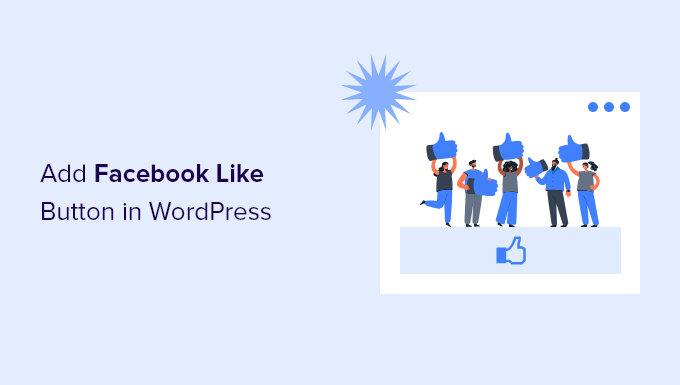
Dlaczego dodać przycisk „Lubię to” na Facebooku w WordPressie?
Facebook jest jedną z najpopularniejszych platform mediów społecznościowych na świecie. Wiele firm wykorzystuje Facebook do nawiązywania kontaktu ze swoimi klientami i promowania swoich produktów.
Dodanie przycisku polubienia na Facebooku do Twojej witryny WordPress może pomóc w zwiększeniu zaangażowania. Zachęca również ludzi do udostępniania Twoich treści na ich profilach na Facebooku i przyciąga nowych użytkowników do Twojej witryny.
Możesz użyć przycisku Lubię to na Facebooku, aby zwiększyć liczbę swoich obserwujących w mediach społecznościowych i zbudować społeczność. Pomaga to zwiększyć świadomość Twoich produktów i usług oraz zwiększa konwersje.
Mając to na uwadze, pokażemy Ci, jak dodać przycisk „Lubię to” na Facebooku do swojej witryny WordPress. Oto szybki przegląd metod, które omówimy w tym przewodniku:
- Metoda 1: Dodaj przycisk Lubię to na Facebooku w WordPressie za pomocą wtyczki
- Metoda 2: Ręczne dodanie przycisku Polubienia na Facebooku w WordPressie
- Dodatkowa wskazówka: Czym są metadane Open Graph i jak je dodać do WordPressa?
- Dodatkowe zasoby: Więcej przewodników po mediach społecznościowych dla stron WordPress
Gotowi? Zobaczmy, jak dodać przycisk polubienia na Facebooku w WordPressie za pomocą wtyczki lub niestandardowego kodu.
Metoda 1: Dodaj przycisk Lubię to na Facebooku w WordPressie za pomocą wtyczki
W tej metodzie użyjemy wtyczki WordPress do dodania przycisku polubienia na Facebooku. Ta metoda jest bardzo łatwa i zalecana dla początkujących.
Najpierw musisz zainstalować i aktywować Like & Share od BestWebSoft. Więcej szczegółów znajdziesz w naszym przewodniku krok po kroku na temat jak zainstalować wtyczkę WordPress.
Po aktywacji możesz przejść do Polub i Udostępnij » Ustawienia z panelu administracyjnego WordPress.
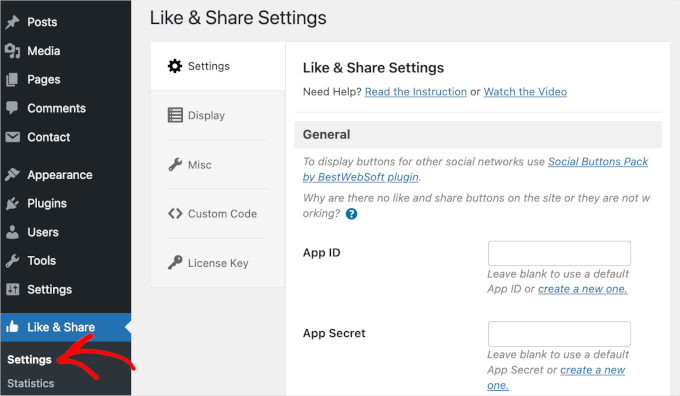
Następnie musisz dodać „ID aplikacji” i „Sekret aplikacji” na Facebooku. Jeśli nie masz tych informacji, po prostu postępuj zgodnie z poniższymi krokami.
Jak utworzyć identyfikator aplikacji i sekret aplikacji na Facebooku
W panelu „Ustawienia” kliknij link „Utwórz nowy” pod polem „ID aplikacji” lub „Sekret aplikacji” w wtyczce Polub i udostępnij.
Spowoduje to przejście do strony Meta for Developers. Sugerujemy otwarcie strony w nowej karcie lub oknie, ponieważ będziesz musiał otworzyć stronę ustawień Polubienia i Udostępnienia w swoim obszarze administracyjnym WordPress, aby wprowadzić identyfikator aplikacji i sekret.
Stąd musisz wybrać typ aplikacji. Wybierz typ aplikacji „Biznes” i kliknij przycisk „Dalej”.
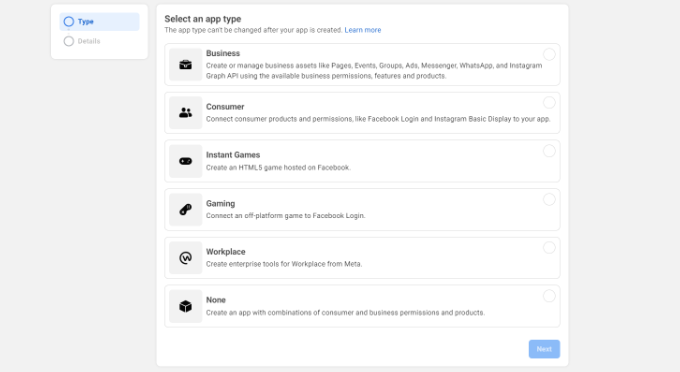
Następnie będziesz musiał podać podstawowe informacje o swojej aplikacji.
Możesz wprowadzić nazwę wyświetlaną dla swojej aplikacji i upewnić się, że prawidłowy adres e-mail pojawi się w polu „Adres e-mail kontaktu z aplikacją”. Facebook automatycznie wybierze adres e-mail konta, na które jesteś aktualnie zalogowany.
Istnieje również opcja wyboru konta biznesowego. Możesz pozostawić ją na 'Nie wybrano konta menedżera biznesowego' i kliknąć przycisk 'Utwórz aplikację'.
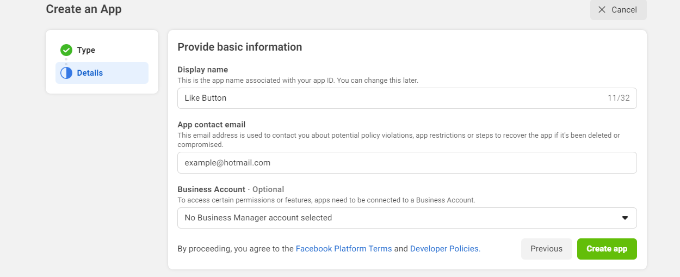
Następnie pojawi się okno dialogowe. Tutaj Facebook poprosi Cię o ponowne wprowadzenie hasła.
Jest to środek bezpieczeństwa zapobiegający złośliwej aktywności na Twoim koncie. Wpisz hasło do swojego konta na Facebooku i kliknij przycisk „Prześlij”.
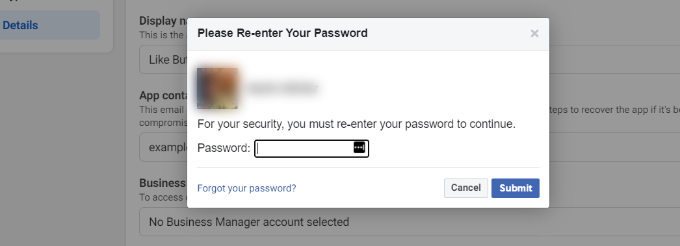
Następnie zobaczysz pulpit swojej aplikacji.
Stąd możesz przejść do **Ustawienia » Podstawowe** z menu po lewej stronie.
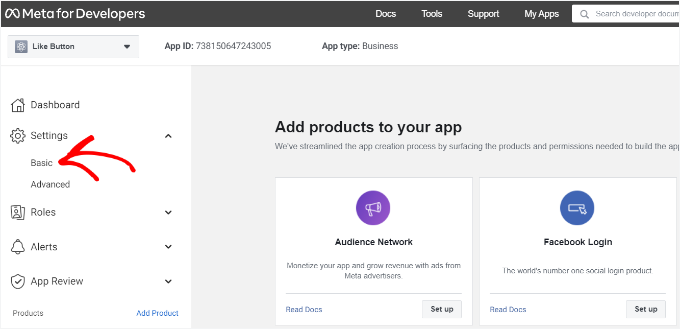
Teraz chcesz rozwinąć menu „Ustawienia” i kliknąć „Podstawowe”.
Tutaj zobaczysz „App ID” i „App Secret”.
Teraz możesz wprowadzić te informacje w ustawieniach wtyczki Like & Share.
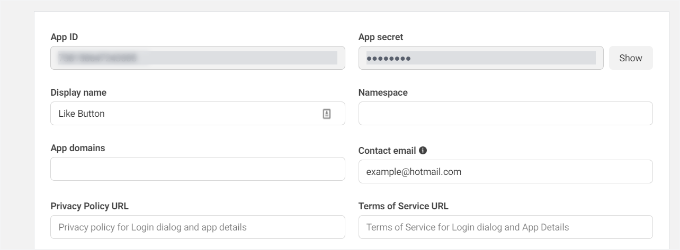
Dokończ dostosowywanie przycisku polubienia na Facebooku
Najpierw skopiuj „App ID” i wróć do zakładki lub okna, w którym masz otwartą stronę Like & Share » Ustawienia. Następnie po prostu wprowadź „App ID” w odpowiednim polu.
Teraz będziesz chciał powtórzyć krok, kopiując dane 'App Secret' ze strony Meta for Developers i wklejając je w ustawieniach wtyczki Like & Share.
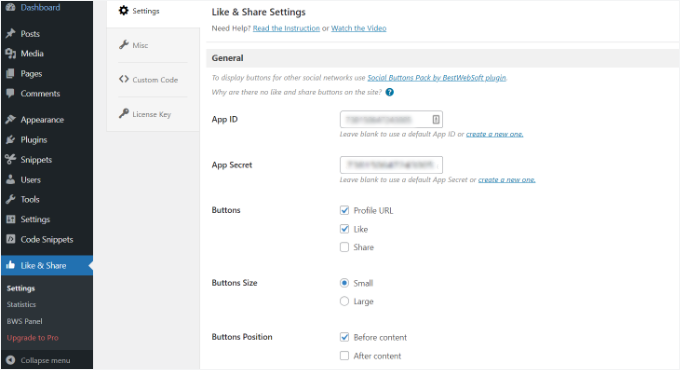
Po wykonaniu tej czynności możesz wybrać, czy chcesz wyświetlić przycisk Polub na Facebooku wraz z adresem URL profilu i przyciskami udostępniania.
Istnieją również ustawienia do edycji rozmiaru przycisku Polubienia na Facebooku, jego pozycji przed lub po treści oraz wyrównania.
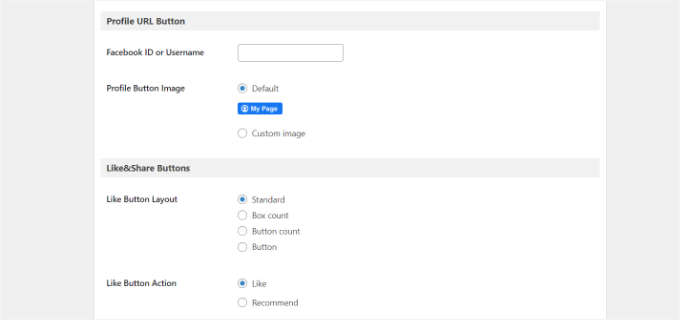
Jeśli włączyłeś przycisk URL profilu, możesz przewinąć w dół do sekcji „Przycisk URL profilu” i wprowadzić swoją nazwę użytkownika lub identyfikator na Facebooku.
Po zakończeniu nie zapomnij zapisać zmian.
Teraz wtyczka automatycznie doda przycisk polubienia na Facebooku do Twojej strony WordPress i ustawi go zgodnie z Twoimi ustawieniami.
Możesz również użyć skróconego kodu [fb_button], aby dodać przycisk Facebook Like w dowolnym miejscu na swojej stronie.
To wszystko! Możesz teraz odwiedzić swoją stronę i zobaczyć przycisk Lubię to na każdym poście.
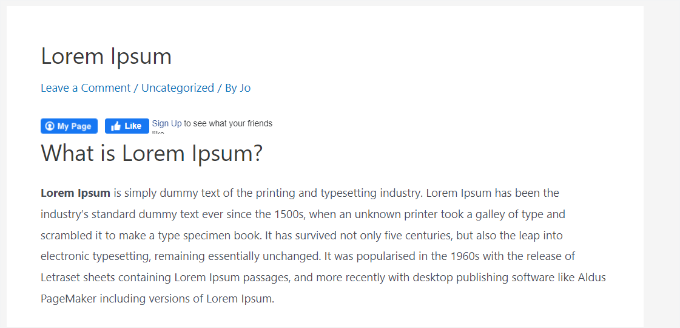
Metoda 2: Ręczne dodanie przycisku Polubienia na Facebooku w WordPressie
Innym sposobem dodania przycisku polubienia na Facebooku jest użycie niestandardowego kodu. Ta metoda wymaga jednak dodania kodu bezpośrednio do WordPress, dlatego polecamy ją tylko tym, którzy czują się komfortowo z edycją kodu.
W tej sekcji użyjemy wtyczki WPCode, ponieważ ułatwia ona każdemu dodawanie kodu do swojego bloga WordPress.
Ale najpierw musisz odwiedzić stronę 'Like Button' na stronie Meta for Developers i przewinąć w dół do sekcji 'Like Button Configurator'.
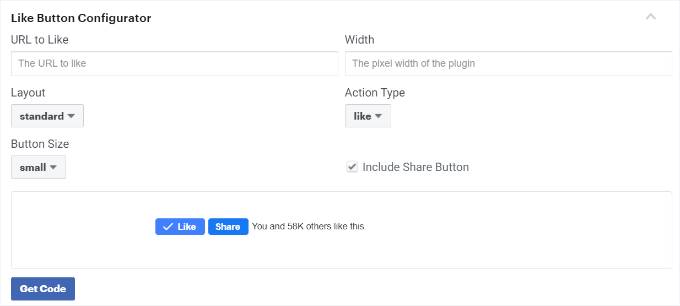
Następnie wprowadź adres URL swojej strony na Facebooku w polu „URL do polubienia”. Spowoduje to połączenie przycisku Polub na Facebooku z Twoją stroną.
Następnie po prostu użyj konfiguracji, aby wybrać układ i rozmiar przycisku Lubię to. Zobaczysz również podgląd przycisku Lubię to.
Gdy będziesz zadowolony z podglądu, kliknij przycisk 'Get Code'. Spowoduje to wyświetlenie okna podręcznego z dwoma fragmentami kodu w zakładce 'JavaScript SDK'.
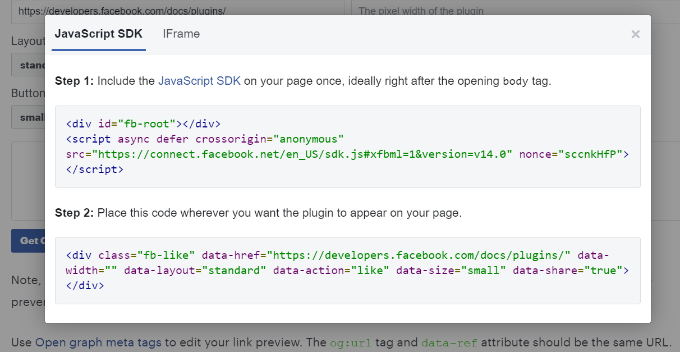
Pamiętaj, że bezpośrednie dodawanie tych fragmentów kodu do motywu WordPress może spowodować awarię Twojej witryny. Ponadto zostaną one nadpisane po zaktualizowaniu motywu.
Dlatego zalecamy korzystanie z wtyczki WPCode. Ta wtyczka pozwala na wklejanie fragmentów kodu na Twoją stronę internetową i łatwe zarządzanie niestandardowym kodem bez edycji plików motywu. Pomaga to uniknąć ryzyka uszkodzenia Twojej witryny WordPress.

Ponadto ufamy WPCode na wszystkich naszych stronach marki, aby płynnie i sprawnie obsługiwać dostosowania. Aby uzyskać więcej informacji na temat naszych doświadczeń z nim, możesz przejść do naszej pełnej recenzji WPCode.
Aby rozpocząć, musisz zainstalować i aktywować darmową wtyczkę WPCode. Aby uzyskać więcej informacji, zapoznaj się z naszym przewodnikiem jak zainstalować wtyczkę WordPress.
📝 Uwaga: Darmowa wersja WPCode pozwala na dodawanie niestandardowych fragmentów kodu, czego będziemy tutaj używać. Jednak uaktualnienie do WPCode Pro odblokowuje dodatkowe funkcje, takie jak pełna historia rewizji i możliwość planowania kodu.
Po aktywacji możesz przejść do Fragmenty kodu » Nagłówek i stopka z poziomu pulpitu WordPress.
Następnie musisz skopiować pierwszy fragment kodu i dodać go do pliku header.php swojego motywu WordPress, tuż po tagu <body>. Po prostu skopiuj kod i wprowadź go w sekcji „Body”.
Po zakończeniu tego procesu nie zapomnij kliknąć przycisku „Zapisz zmiany”.
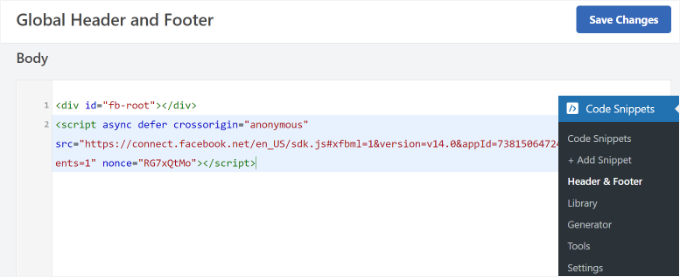
Następnie musisz skopiować drugi fragment kodu i wkleić go na swojej stronie WordPress, aby wyświetlić przycisk „Lubię to” na Facebooku.
Aby to zrobić, możesz przejść do Fragmenty kodu » + Dodaj fragment z panelu administracyjnego WordPress. Lub po prostu kliknij przycisk „Dodaj nowy” na pulpicie WPCode.
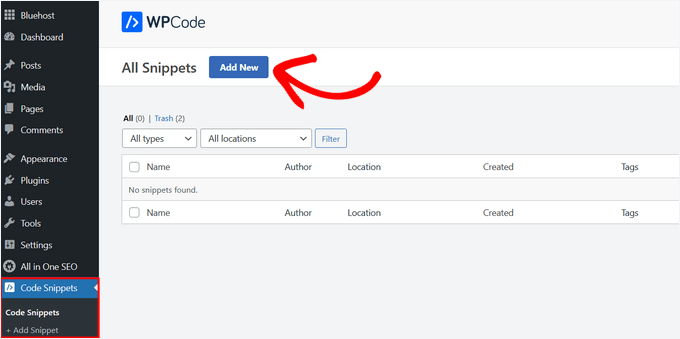
Na następnym ekranie WPCode pozwoli Ci wybrać fragment z gotowej biblioteki lub dodać nowy niestandardowy kod.
Wybierz opcję 'Add Your Custom Code (New Snippet)' i kliknij przycisk 'Use snippet'.
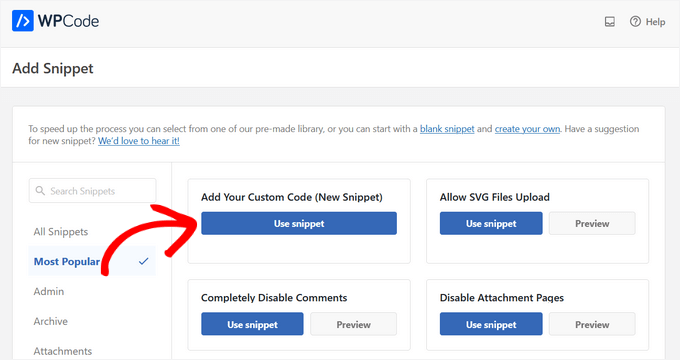
Następnie możesz nadać swojemu niestandardowemu kodowi nazwę i wprowadzić drugi fragment kodu w sekcji „Podgląd kodu”.
Upewnij się, że klikniesz na menu rozwijane „Typ kodu” i wybierzesz „Fragment kodu HTML” jako typ kodu.
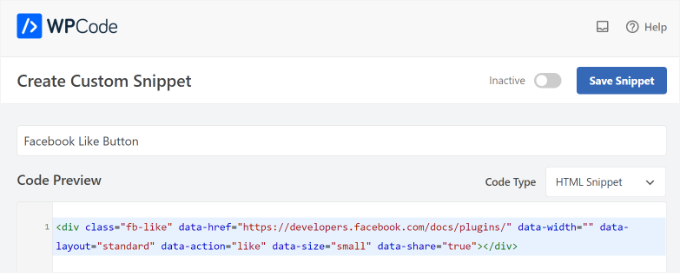
Następnie możesz przewinąć w dół do sekcji „Wstawianie” i wybrać, gdzie chcesz, aby pojawił się przycisk Polub na Facebooku.
Na przykład, powiedzmy, że chcesz, aby pojawiło się przed treścią.
Po prostu kliknij menu rozwijane „Lokalizacja” i wybierz opcję „Wstaw przed treścią” w sekcji „Strona, Post, Typy Postów Niestandardowych”.
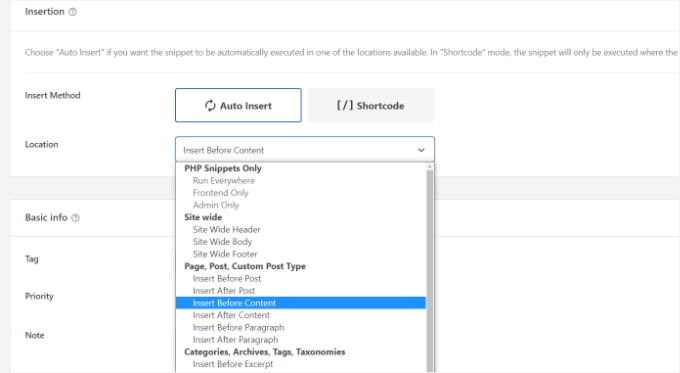
Po zakończeniu możesz kliknąć przycisk „Zapisz fragment”.
Będziesz musiał również kliknąć przełącznik i zmienić go z „Nieaktywny” na „Aktywny”.
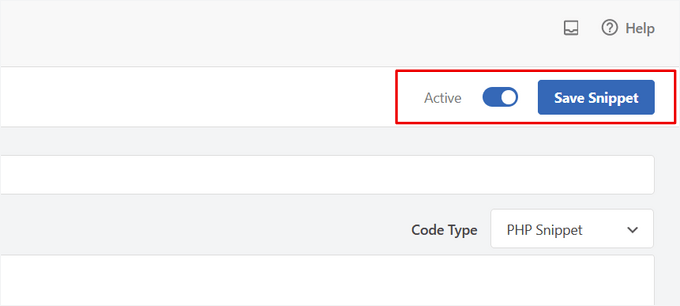
To wszystko. Przycisk Polub na Facebooku pojawi się na Twojej stronie internetowej po wprowadzeniu kodu.
Dodatkowa wskazówka: Czym są metadane Open Graph i jak je dodać do WordPressa?
Open Graph to metadane, które pomagają Facebookowi zbierać informacje o stronie lub wpisie na Twojej stronie WordPress. Te dane obejmują obraz miniatury, tytuł wpisu/strony, opis i autora.
Facebook jest dość inteligentny w pobieraniu pól tytułu i opisu. Jednak jeśli Twój post ma więcej niż jeden obraz, czasami może wyświetlać nieprawidłową miniaturę po udostępnieniu.
Jeśli już korzystasz z wtyczki All in One SEO (AIOSEO), problem ten można łatwo rozwiązać.
W WPBeginner sami używamy wtyczki AIOSEO do zarządzania ustawieniami OpenGraph dla Facebooka i X, między innymi w działaniach SEO. Jesteśmy jej wielkimi fanami i możesz przeczytać naszą obszerną recenzję AIOSEO, aby uzyskać więcej szczegółów.
Aby to zrobić, możesz najpierw przejść do All in One SEO » Social Networks i przełączyć się na zakładkę Facebook.
Następnie kliknij przycisk „Prześlij lub wybierz obraz”, aby ustawić „Domyślny obraz posta na Facebooku”, jeśli Twój artykuł nie ma obrazu Open Graph.
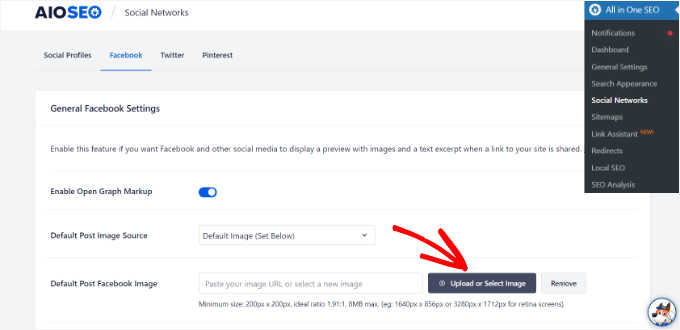
Poza tym możesz skonfigurować obraz otwartej grafiki dla każdego indywidualnego posta lub strony.
Podczas edycji posta po prostu przewiń w dół do sekcji Ustawienia AIOSEO w edytorze treści. Następnie możesz przełączyć się na zakładkę „Społecznościowe” i zobaczyć podgląd swojego miniatury.
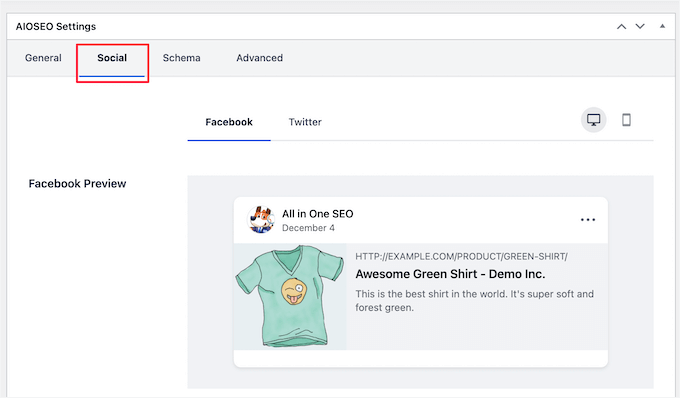
Teraz przewiń w dół do opcji „Źródło obrazu”. Następnie wybierz obraz otwartej karty dla swojego posta.
Na przykład możesz wybrać opcję „Dołączony obraz”, „Pierwszy obraz w treści” lub „Niestandardowy obraz” jako miniaturę Open Graph.
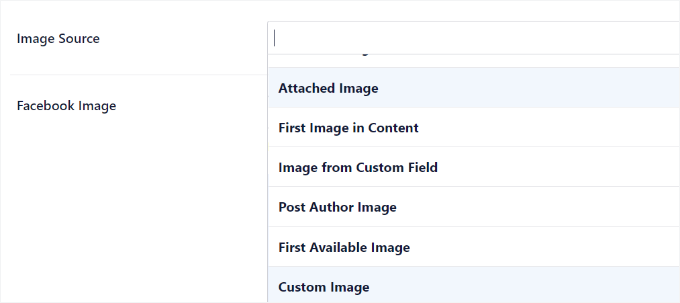
Aby uzyskać więcej szczegółów i alternatywne sposoby dodawania metadanych Open Graph, zapoznaj się z naszym przewodnikiem na temat dodawania metadanych Facebook Open Graph w WordPress.
Dodatkowe zasoby: Więcej przewodników po mediach społecznościowych dla stron WordPress
Mamy nadzieję, że ten artykuł pomógł Ci dowiedzieć się, jak dodać przycisk Polub na Facebooku w WordPressie. Następnie możesz również zapoznać się z naszymi przewodnikami na temat:
- Jak wyświetlić recenzje strony na Facebooku w WordPress
- Jak osadzić albumy Facebook w WordPress
- Najlepsze wskazówki i samouczki dotyczące Facebooka dla użytkowników WordPressa
- Jak przeprowadzić konkurs w mediach społecznościowych, aby rozwinąć swoją witrynę
- Jak wykorzystać media społecznościowe do zwiększenia liczby subskrybentów e-mail w WordPress
- Najlepsze podpowiedzi AI dla blogerów, marketerów i mediów społecznościowych
- Kompletny arkusz ściągawki mediów społecznościowych dla WordPress
- Najlepsze wtyczki mediów społecznościowych dla WordPressa
Jeśli podobał Ci się ten artykuł, zasubskrybuj nasz kanał YouTube po samouczki wideo WordPress. Możesz nas również znaleźć na Twitterze i Facebooku.





wpbeginner
@artist74 Nie ma DOKŁADNEGO punktu, ponieważ się zmienia. Dokładny punkt jest określany przez to, gdzie chcesz, aby kod się pojawił (na przykład przed postem / po poście / w poście itp.). Gdy już to zdecydujesz, możesz również dalej stylizować za pomocą CSS!
lo0_ro
i tutaj są kody dla innych usług, takich jak identi.ca, google plus one, twitter itp.
http://www.lo0.ro/2011/add-wordpress-social-buttons-from-code-identi-ca-facebook-like-twitter-and-google-plus-one/
dekanfari
Czy mogę wyrównać go do lewej?
Ovidiu
Czy masz jakieś rady dotyczące wersji XFBML? Skopiowałem kod bezpośrednio ze strony deweloperów Facebooka, czy muszę coś jeszcze zrobić?
Personel redakcyjny
Musisz dodać metadane Open Graph do strony. Zredagowaliśmy artykuł. Szukaj UWAGI.
Admin
tyasmedika
Świetny post…
Jak dodać przycisk polubienia na Facebooku na wordpress.com?
Dzięki.
Proszę, odwiedź mój blog. ^_^
Personel redakcyjny
Nie możesz… Przejdź na samodzielnie hostowany WordPress.
Admin
Dror
Cześć,
Czy jest sposób, aby dodać przycisk polubienia do komentarzy na blogu WordPress?
Dzięki
Personel redakcyjny
Tak, możesz mieć przycisk polubienia przy każdym komentarzu, pobierając stały link do komentarza zamiast stałego linku do posta.
Admin
Redefining
Mam stronę na wordpress.com. Nie mam pojęcia, od czego zacząć dodawanie przycisku Facebook Like. Próbowałem znaleźć opcję single.pnp. Potrzebuję tylko wskazówki, gdzie ją znaleźć, ponieważ próbowałem przejść do Wygląd, a następnie Motyw, a potem co? Czy możesz mi doradzić?
Personel redakcyjny
To nie działa ze stronami WordPress.com.
Admin
Ruby
Wielkie dzięki, właśnie tego szukałem………
Aaron Grey
Waham się między dodaniem przycisku polubienia na Facebooku na górze moich postów lub blisko dołu, więc dodałem go w obu miejscach. Czy ktoś wie, czy posiadanie 2 przycisków polubienia na jednym poście może powodować problemy?
Personel redakcyjny
Nie powinno to powodować problemów… oba nie zaktualizują się jednocześnie, ale na każdej stronie odświeżania będzie wyświetlana ta sama liczba.
Admin
Aaron Grey
Tak właśnie myślałem. Nigdy nie słyszałem, żeby ktoś o tym wspominał w żadnych poradnikach. Dzięki za informację.
Dimitris
Cześć, umieściłem kod w pliku single.php i wewnątrz pętli, zgodnie z Twoimi instrukcjami. Kiedy polubię post, wszystko działa poprawnie, z wyjątkiem tytułu posta na ścianie FB.
Na przykład na MyWebiste.com polubiłem post o tytule MyPost.
Na ścianie FB pokazuje, że ktoś „lubi MyWebiste na MyWebiste.com”, a nie „MójPost na MyWebiste.com”.
Jednak link „MojaStrona” poprawnie odnosi się do odpowiedniego artykułu „MójPost”.
Dla mnie oznacza to, że kod działa bez zarzutu i pobiera właściwy artykuł, ale nie tytuł artykułu i próbuję dowiedzieć się, czy muszę zrobić coś jeszcze, aby pokazać tytuły postów na ścianie FB, a nie tylko ich poprawne linki.
Wszelkie sugestie będą mile widziane.
Dziękuję.
Personel redakcyjny
To dziwne, bo powinno pobrać tytuł Twojej strony. Ale aby to nadpisać i naprawić ten problem, spójrz na link do zasobów, który mamy w tym artykule. Będziesz musiał dodać meta tag og:title.
Admin
Alvin
Witaj..
Jestem właścicielem strony i chcę wiedzieć, kto kliknął przycisk „Lubię to” pod każdym postem. Nie tylko liczbę osób. Czy jest to możliwe?
Personel redakcyjny
Tak, możesz ustawić showfaces=true, a pokaże twarze niektórych osób.
Admin
Aaron Torng
Dzięki za poradnik! Pomyślnie dodałem przycisk „lubię to” do moich poszczególnych stron, ale nadal mam problemy z dodaniem go do mojej głównej witryny, która agreguje wszystkie posty. Czy wiesz, do której strony mam go dodać i gdzie?
Dzięki jeszcze raz,
Aaron
Personel redakcyjny
Użyj pola polubień zamiast przycisku polubień na stronie głównej i umieść je w swoim pasku bocznym.
Admin
Sipovics
Cześć!
Mój problem polega na tym, że jeśli "Polubię" post na mojej stronie (która nazywa się kukkold.hu), Facebook pokazuje na mojej stronie profilowej, że lubię link kukkold.hu na stronie kukkold.hu. Doświadczam tego przy każdym poście, więc zawsze polubię stronę główną mojej witryny zamiast linku i nazwy posta. Co może być problemem? Próbowałem różnych wtyczek do polubień i wkleiłem kod bezpośrednio do pętli, ale problem jest zawsze taki sam i jest naprawdę irytujący. Dla testu wpisałem konkretny permalink w miejsce bloku ID)); ?>, ale problem był ponownie taki sam.
Licznik polubień działa dobrze, więc wie, który post ile razy został polubiony.
Co mam zrobić? Proszę o pomoc!
Dziękuję!
Personel redakcyjny
Musisz wkleić kody wymienione w tym poście WEWNĄTRZ PĘTLI. Jeśli wkleisz je poza pętlą posta, nie zadziałają.
Admin
charle
używam wordpress.com i próbuję dodać pole lubię to na Facebooku do mojego bloga, ale nie działa. Czytałem na forum, że wordpress.com nie potrafi odczytać kodu iframe. Czy to prawda? Jakieś rozwiązanie?
Personel redakcyjny
Tak, to prawda. Jesteś bardzo ograniczony ze stroną WordPress.com. Rozwiązaniem jest przejście na samodzielnie hostowany hosting. Skorzystaj z naszej bezpłatnej usługi konfiguracji.
Admin
Joe
Dodałem kod w pętli, tak jak mówiłeś… ale nic się nie dzieje!! Próbowałem wielokrotnie, w różnych częściach pętli…. po prostu to nie działa!! Jakieś sugestie? Dzięki
Personel redakcyjny
To jest kod iframe, więc powinien działać, ponieważ używamy go na naszej stronie.
Admin
drowan
To jest świetne, jednak napotykam na błąd. Kod działa poprawnie i wszystko, ale kiedy go polubię, zamiast 'polubić' konkretny post, 'polubi' stronę główną. To samo pojawia się na kanale Facebook, tylko strona główna. Czy spotkałeś się z tym problemem i co mogę zrobić, aby go naprawić?
Dzięki!
drowan
Moja struktura permalinków w tej chwili to /%category%/%postname%/ dla odniesienia. Wszystkie testowane „polubienia” linkują tylko do strony głównej.
Personel redakcyjny
Jeśli umieścisz kod w pętli, to nie powinno się tak dziać.
Admin
Personel redakcyjny
Kod, który mamy, jest taki sam jak ten działający na tej stronie. Dopóki umieścisz go w pętli, powinien polubić stronę, na której jesteś.
Admin
wilson keenan
Bardzo dziękuję za to.
Zastanawiałem się – czy używasz tego iframe (w single.php) z meta tagami w header.php?
Zastanawiam się, czy adres URL w meta tagach Facebooka koliduje z moją możliwością używania edytowanego przycisku „Lubię to”, który masz tutaj?
Bardzo dziękuję,
Wil
Personel redakcyjny
Obecnie nie używamy tagów Meta w nagłówku, więc jest to tylko iframe.
Admin
Aurora
Dziękuję za ten świetny zasób! Bawiłem się z niektórymi wtyczkami, ale po prostu nie działały dobrze dla mnie, a potem znalazłem Twój tutorial i po prostu edytowałem kod i VOILA! Sukces!
Dzięki!
Andreas Koutsoukos
Cześć, mam pytanie dotyczące układu tego przycisku na Facebooku.
Znajomy chce, żebym zakodował bloga i wysłał mi to zdjęcie, pytając, czy mogę dostosować przycisk polubień w ten sposób http://www.andreaskoutsoukos.com/images/others/facebook_like.jpg.
Czy jest to możliwe i jak?
Jeśli ktoś o tym wie.
Personel redakcyjny
Nie sądzę, żeby istniało API Facebooka, które pozwala polubić układ…
Admin
Ash Robbins
Świetny post, chłopaki, tak proste do dodania i skonfigurowania. Dobra robota.
sanjaperic
Cześć!
Dzięki za ten kod, ale coś nie działa dobrze…
Na przykład, jeśli wejdę na post, widzę „Przycisk polubienia i Bądź pierwszym…wiadomość” Ok. Dobrze! Nikt jeszcze nie polubił, nieważne, będę pierwszy… więc klikam, Polub! A potem! Wow! Widzę, że 178 osób faktycznie to polubiło, ale nie mogłem tego zobaczyć, dopóki sam tego nie polubiłem. Rozumiesz? Mój angielski nie jest najlepszy, ale mam nadzieję, że zrozumiesz, o czym mówię…
If you find a time to go on my page, and then on any single post, you will see Like button and message Be the first… but if you like it, than you’ll find out, that you weren’t the first!
Personel redakcyjny
To bardzo dziwny problem. Zwykle nie pokazuje zdjęć, chyba że polubią je Twoi znajomi, ale z pewnością pokazuje liczbę polubień.
Admin
Huw Rowlands
Cześć,
Mam przycisk polubienia, ale po kliknięciu nic się nie dzieje??
Czy możesz mi w tej sprawie doradzić...
Zainstalowałem nawet wtyczkę Facebook 'Like' i miałem dokładnie ten sam problem.
Dzięki
Personel redakcyjny
Nie wiem, co może być problemem. Mamy dokładnie ten sam kod działający na naszej stronie… i działa poprawnie.
Admin
Paul
Działa idealnie teraz. Musiał być problem po stronie Facebooka.
Rakibul Islam
This seems to not working on my site. It showing error after clicking the Like button.
Co mogę teraz zrobić?
Personel redakcyjny
Używamy tego kodu na naszej stronie, więc nie wiemy, co może powodować błąd. Czy możesz sprecyzować, jaki to błąd.
Admin
Janice
Dziękuję za tutorial i świetne wskazówki w komentarzach. Właśnie zainstalowałem na motywie Atahualpa. Świetnie!
Sean Serritella
Wszystko, co wiem, to to, że próbowałem wstawić kod dla przycisku „Lubię to” i teraz mam podwójne posty.
Eli
U mnie dzieje się to samo, musiałem to usunąć, ponieważ podwajało tekst moich postów
Eli
Ok! Zapomnij o tym! Ponieważ IE skacze za każdym razem, gdy coś wklejam, musiałem jakoś podwoić część „the-content”.
Zastąpiłem stary plik single.php, wkleiłem ponownie Twój kod (zarówno przed, jak i po „the-content” i działa świetnie w obu przypadkach!
Milion podziękowań za kod!
agon
dziękuję bardzo, zaczynam uczyć się wordpressa… i tutaj znalazłem Twoją stronę bardzo pomocną dla początkujących… tak trzymaj…
Sean Serritella
Stary, co za pętla? Co to jest pętla? Nie rozumiem, co to znaczy. Próbowałem wkleić kod na pojedynczej stronie php, ale nic nie dostałem.
Personel redakcyjny
Pętla to kod, który mówi, czy to post…http://codex.wordpress.org/The_Loop
Admin
Jason Fonceca
Fantastycznie! Wiem, że to może wydawać się bezużytecznym komentarzem, ale naprawdę jestem podekscytowany znalezieniem tego tutorialu. Wielkie uznanie.
Lindsay
Czy jest sposób, aby pokazać na pasku bocznym, które posty mają najwięcej polubień na Facebooku. Myślę, że fajnie byłoby zobaczyć, które są najczęściej udostępniane.
Mark
Wkleiłem to w mój style.php, więc nie jestem pewien, czy to masz na myśli, mówiąc „umieść to w mojej pętli”?
Mark
przepraszam, plik single.php to ten, który zmieniłem
Mark
Dodałem przycisk do mojego kodu i pojawia się on w moich postach na blogu. jednak kiedy go klikam, mój profil na Facebooku nie odzwierciedla, że mi się podoba? Czy robię coś źle? Powinienem widzieć, że mi się podoba w moim feedzie, czy mam rację?
Personel redakcyjny
Tak, powinieneś widzieć, że Ci się podoba w swoim kanale. Czy wklejasz kod w swojej pętli?
Admin
Jose
Dzięki za udostępnienie. Jak sprawiłeś, że Twoje przyciski retweet i udostępniania na Facebooku pozostają na stałe na Twoim blogu?
Personel redakcyjny
Używamy wtyczki o nazwie Smart Sharing. Przeszukaj naszą stronę, a powinieneś ją znaleźć. Jest ona dostępna wyłącznie dla użytkowników WPBeginner.
Admin
Janek
dzięki za świetny tutorial przycisk polubień na Facebooku w WordPress
Bardzo mi pomogło!
Que
Dodałem kod w pliku single.php, ale przycisk nie pojawia się na wszystkich moich postach.
Jeśli dodam kod do każdego posta (z zakładki HTML), przycisk się pojawia, ale napotykam problemy.
Dlaczego tak się dzieje? Czy to zależy od motywu?
Personel redakcyjny
Pojawi się na wszystkich stronach pojedynczych postów. Jeśli masz na myśli, że chcesz go pokazać na wszystkich stronach w swoich stronach kategorii lub stronach indeksu, wtedy musiałbyś wkleić kod do swojego index.php wewnątrz pętli postów.
Admin
Que
Nie, mam na myśli, że nie wyświetla się w moich postach, a nie na stronach. Albo może umieściłem go w złej części pliku single.php. Czy można wkleić kod w dowolnym miejscu pliku single.php?
Dzięki.
Andrea
To prawdopodobnie głupie pytanie, ale czy instrukcje, które podałeś, odnoszą się do małej grafiki „kciuk w górę” i tekstu (pokazującego 184 osoby polubiły to. Bądź pierwszym ze swoich znajomych) na górze tego posta? Czy odnoszą się do większej kwadratowej grafiki pojawiającej się po lewej stronie twojego posta (tej pojawiającej się pod twoim przyciskiem tweetmeme, która mówi 45 udostępnień).
Chciałbym po prostu umieścić ten większy kwadratowy grafik na moim blogu, aby pojawił się obok mojego przycisku tweetmeme i zastanawiam się, jak to zrobić? Czy jest jakiś tutorial, do którego możesz mnie skierować?
Dziękuję bardzo za wszelkie wskazówki!
Personel redakcyjny
Ten tutorial dotyczy przycisku polubienia. Po prostu użyj przycisku wyszukiwania na tej stronie i poszukaj przycisku Udostępnij na Facebooku, a znajdziesz tutorial do tego.
Admin
Andrea
Thank you – I did as you suggested and found that tutorial and left you a comment on it as I was unsuccessful in getting it to work.
dillon
Przycisk „Lubię to” to najlepsza mała dodatkowa funkcja strony, dzięki za lekcję.
Sara
Działa świetnie! Zmniejszyłem wysokość, aby pozbyć się białej przestrzeni, którą powodował, ale to była jedyna poprawka.
Jan Weiss
Dodałem kod, ale jeśli przejdziesz do pojedynczego wpisu, pojawi się strona, która pokazuje tylko przycisk „lubię to” na Facebooku i nie przenosi widza do faktycznego wpisu. Więc teraz, jeśli widz przejdzie do wpisu, traci go. Jakieś sugestie?
Personel redakcyjny
Nie mam pojęcia, o czym mówisz. Proszę, skorzystaj z naszego formularza kontaktowego i pokaż nam, o czym mówisz, linkując do swojej strony.
Admin
Ciociaria
Witam wszystkich,
Widzę, że więcej blogów używa tylko przycisku i liczby osób, które polubiły, bez frazy „bądź pierwszym…”.
jak to możliwe?
dzięki
Personel redakcyjny
Musisz zmienić parametr układu na button_count, jak wspomniano w artykule.
Admin
Titanas
Cześć,
A co z dodaniem adresu URL strony po tytule posta? Coś w tym stylu: X polubiło Y na Z.com
Personel redakcyjny
Nie masz na to wpływu. To Facebook to robi i wyświetla tylko tytuł strony.
Admin
PelFusion
just placed one on my blog
Danang Sukma
W końcu znalazłem wtyczkę podobną do pływającego efektu na Twojej stronie. Dziękuję za udostępnienie.
Mike
Zauważyłem, że wiele stron dodało przycisk na górze strony. Ale czy nie lepiej umieścić przycisk na dole strony, pozwalając czytelnikom kliknąć bez przewijania w górę po przeczytaniu artykułu?
Personel redakcyjny
It is entirely up to the blogger. You can try it on your blog and see which placement works best for you
Admin
Tiffany
Czy jest sposób, aby wyświetlał się na dole posta zamiast na górze?
Personel redakcyjny
Tak, po prostu dodaj go po części the_content php swojego posta… Na dole pętli. Można go dodać w dowolnym miejscu pętli… nie musi być na górze.
Admin
Heather
Niestety, nie mam pliku single.php w moim motywie Atahualpa. Nie wiem, gdzie indziej mógłbym umieścić kod. Jakieś pomysły?
Personel redakcyjny
Nie wiem zbyt wiele o motywie Atahualpa. Proszę, zapytaj na ich forum wsparcia, lub skontaktuj się z nami mailowo, a możemy przyjrzeć się bliżej Twojej stronie.
Admin
Stu
Re: Atahaulpa – Miałem ten sam problem co Heather. Rozwiązanie: W panelu administracyjnym przejdź do Wygląd – Opcje motywu Atahaulpa – Styl i edytuj środkową kolumnę. Wklej to w sekcji „The LOOP”. Działa świetnie!
Stu
Zauważyłem ostatnio, że ten przycisk „Lubię to” na Facebooku pojawia się na coraz większej liczbie stron i myślę, że to świetny pomysł. Czas zobaczyć, czy uda mi się to teraz zaimplementować… BEZ całkowitego niszczenia mojego bloga (byłbyś zaskoczony, jak blisko byłem wielokrotnie, gdy zacząłem grzebać w kodzie – porażka programisty).
Bottomless
Oto wtyczka WordPress:
http://wordpress.org/extend/plugins/like
Nie jest potrzebne żadne kodowanie, możesz dostosować wygląd i umiejscowienie przycisku w interfejsie ustawień.
Amanda
Uwielbiam artykuł, ale napotkałem pewne problemy. Nie wiem, gdzie znaleźć plik single.php? lol. Czy możesz mi pomóc? Używam wordpress.com i nie jestem pewien, czy to robi różnicę.
Dzięki!
Personel redakcyjny
Dotyczy to blogów WordPress hostowanych samodzielnie, a nie motywów WordPress.com.
Admin
jeh
Dokładnie tego szukałem. Dzięki
hydir
Dzięki za ten tutorial.
Naprawdę szukałem sposobu na jego wdrożenie i znalazłem odpowiedź tutaj.
Świetnie!